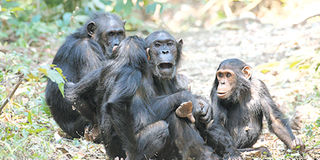Being sociable a medical tool: study

Chimpanzees at the Gombe Stream National Park. A research shows that sociability amongst chimps can increase in good gut microbes. PHOTO | FILE
What you need to know:
A study done among chimpanzees at the Gombe Stream National Park in the country for over eight years. suggests that being sociable helps transmit beneficial gut microbes among chimps.
Dar es Salaam. Being sociable, which involves coming into close physical contact during shaking of hands or touching others, risks spreading harmful germs that cause diseases. But could it, possibly, help reduce the risks of being obese and getting diabetes?
A study done among chimpanzees at the Gombe Stream National Park in the country for over eight years. suggests that being sociable helps transmit beneficial gut microbes among chimps.
Scientists don’t yet know whether social networks help maintain gut microbiome diversity in humans as it does in chimps. But reduced gut microbial diversity in humans has been linked to obesity, diabetes, Crohn’s and other diseases, with the more diverse people’s microbiomes are, the more resistant they seem to be to opportunistic infections.
Researchers from various US-based institutions - The University of Texas at Austin, Duke University, The University of California, Berkeley - monitored changes in the gut microbes and social behaviour of wild chimpanzees.
Their research found that the number of bacteria species in each chimp’s GI tract (gastrointestinal tract) increases when the chimps are more sociable.
“The results help scientists better understand the factors that maintain a healthy gut microbiome. The warm, soft folds of our intestines are home to hundreds of species of bacteria and other microbes that help break down food, synthesize vitamins, train the immune system and fight infections,” said a study report published at the Science Advances website at the weekend.
The researchers analysed the bacterial DNA in droppings collected from 40 chimpanzees between 2000 and 2008. The chimpanzees ranged in age from infants to seniors.
The researchers identified thousands of species of bacteria thriving in the animals’ guts, many of which are also commonly found in humans, such as Olsenella and Prevotella.
The team then combined the microbial data with daily records of what the animals ate and how much time they spent with other chimps versus alone.
“Chimpanzees tend to spend more time together during the wet season when food is more abundant,” said Duke University research scientist Steffen Foerster, who co-authored the study. “During the dry season they spend more time alone.”
The researchers found that each chimpanzee carried roughly 20 to 25 per cent more bacterial species during the abundant and social wet season than during the dry season.
Gut bacteria probably passed from chimp to chimp during grooming, mating or other forms of physical contact, or when they inadvertently step where other chimps have pooped, said co-author Anne Pusey, chair of Duke’s department of evolutionary anthropology.
The study’s authors said the findings suggest that, over a lifetime, social interactions with other chimps were just as important for gut microbial diversity as initial exposure from the mother.




